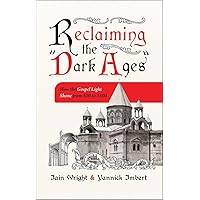
Iain Wright and Yannick Imbert
Reviewed by: Brian L. De Jong
Reclaiming the “Dark Ages”: How the Gospel Light Shone from 500 to 1500, by Iain Wright and Yannick Imbert. Christian Focus, 2024. Paperback, 152 pages, $10.49. Reviewed by OP pastor Brian L. De Jong.
Imagine you are learning the German language. You have made progress but remain far from fluent. In your zeal for mastery, you travel to Germany. Once there, you realize your dilemma. As you converse with native speakers, you understand a percentage of what they say but miss as much as you grasp. Everything seems simultaneously familiar and unfamiliar. You are aware that your knowledge of German history, philosophy, and culture is incomplete. You know certain things, but there is so much more to learn.
Such might be the experience of a reader of this book by Iain Wright and Yannick Imbert. From a shared love for church history, these brothers have produced a helpful introductory survey of the so-called “Dark Ages.” Highlighting ten Christian leaders from the year 500 to the year 1500, the authors seek to demonstrate that the light of the gospel shone throughout Europe during the medieval period. Those centuries were not as dark as they are sometimes characterized.
The book introduces approximately one theologian per century, and includes Leo the Great, Boethius, Alcuin, Gottschalk, Anselm of Canterbury, Bernard of Clairvaux, Peter Waldo, Bonaventure, John Wycliffe, and Jan Hus. Some of these names are familiar, others are more distant, and a few may be altogether unknown.
Each chapter provides a brief biographical sketch of the individual as well as information on the broader context of the era. Theological contributions (and controversies) are discussed, as well as important works by that leader. Anselm’s Cur Deus Homo? is one example. Finally, the chief contributions of the leader in view are reviewed, as are lessons learned for modern life.
But why would the reader be like our budding German speaker? Why would he or she find this volume simultaneously familiar and unfamiliar, exhilarating and puzzling?
Because this book is aimed at a casual student of church history and not at the seminarian or graduate student, many will consider the entire medieval era entirely foreign and largely unintelligible. For instance, what do most of us know about Charlemagne? Perhaps we’ve heard the name and have a vague sense that he was a king or an emperor of some sort, but that exhausts our knowledge.
Modern education (both Christian and secular) has severely shortchanged the study of history. Particularly emaciated is any understanding of medieval Europe. Many Christians (including most church officers) have almost no general knowledge of the one thousand years under consideration in this book. Recognizing Charlemagne’s name is not the same as understanding his importance to Western history.
Ecclesiastical history is also frequently deficient. As members of the Orthodox Presbyterian Church, we love the Reformation. We also appreciate Puritan England and the Westminster Assembly. We further delight in the study of the OPC from 1936 to the present. All of that is well and good. But our areas of ignorance are sadly profound. Not only do we not know who Gottschalk was, but it is hard to grasp the nuances of his ninth-century perspective on double predestination and divine grace.
Readers with an interest in church history will likely find this a hard book, but a good book. It will take mental effort to understand these figures, but the effort is worthwhile. Dr. Norman De Jong maintained that real education is necessarily painful because true learning confronts our ignorance. It reveals to us what we do not know, in order that we can gain new information and receive truly new insights. Readers may find this volume humbling and somewhat painful, but faithful are the wounds of these friends.
February 01, 2026
January 25, 2026
January 18, 2026
January 11, 2026
Texts that Transform: Church and Ministry
January 04, 2026
December 28, 2025
December 21, 2025
© 2026 The Orthodox Presbyterian Church